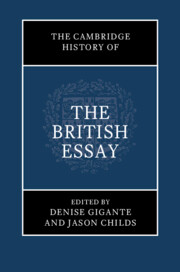Book contents
- The Cambridge History of the British Essay
- The Cambridge History of the British Essay
- Copyright page
- Contents
- Illustrations
- Contributors
- Acknowledgements
- Preface to a History in the Manner of an Essay
- Part I Forming the British Essay
- Part II The Great Age of the British Essay
- 10 Essayistic Personae and Personhood
- 11 Clubs and Coffeehouses: Sociability and the Essay
- 12 Loose Sallies of the Mind: Distraction and the Essay
- 13 The Essay and the Rise of the Novel
- 14 The Periodical Essay and the Rise of Literary Professionalism
- 15 On Books: The Bibliographical Essay
- 16 Satire and the Essay
- 17 Food and the Essay
- 18 Forms of Thought: Dreams, Reverie, and the Essay
- 19 The Urban Familiar Essay of the Romantic Era
- Part III Assaying Culture, Education, Reform
- Part IV Fractured Selves, Fragmented Worlds
- Part V The Essay and the Essayistic Today
- Book part
- Bibliography
- Index
12 - Loose Sallies of the Mind: Distraction and the Essay
from Part II - The Great Age of the British Essay
Published online by Cambridge University Press: 31 October 2024
- The Cambridge History of the British Essay
- The Cambridge History of the British Essay
- Copyright page
- Contents
- Illustrations
- Contributors
- Acknowledgements
- Preface to a History in the Manner of an Essay
- Part I Forming the British Essay
- Part II The Great Age of the British Essay
- 10 Essayistic Personae and Personhood
- 11 Clubs and Coffeehouses: Sociability and the Essay
- 12 Loose Sallies of the Mind: Distraction and the Essay
- 13 The Essay and the Rise of the Novel
- 14 The Periodical Essay and the Rise of Literary Professionalism
- 15 On Books: The Bibliographical Essay
- 16 Satire and the Essay
- 17 Food and the Essay
- 18 Forms of Thought: Dreams, Reverie, and the Essay
- 19 The Urban Familiar Essay of the Romantic Era
- Part III Assaying Culture, Education, Reform
- Part IV Fractured Selves, Fragmented Worlds
- Part V The Essay and the Essayistic Today
- Book part
- Bibliography
- Index
Summary
This chapter traces the history of the essay against the backdrop of changing theories of distraction in the long eighteenth century. As the population of urban centres grew, readers’ seemingly waning attention spans had to counter a barrage of auditory and visual stimuli. Everyday diversions were compounded by literary ones: falling paper costs led to an explosion of print material, forcing the periodical essay to compete with a dizzying array of prose fiction, poems, sermons, and histories. Focusing on a series of prominent eighteenth-century and Romantic essayists, particularly Samuel Johnson, Leigh Hunt, and Charles Lamb, we argue that the essay form is powerfully shaped by its engagement with the wandering mind. Debates over distraction that began in the Enlightenment continue to shape the genre today, as modern essay forms – New York Times essays, blogs, Twitter feeds – continue to structure themselves around assumptions about short attention spans.
Keywords
- Type
- Chapter
- Information
- The Cambridge History of the British Essay , pp. 167 - 182Publisher: Cambridge University PressPrint publication year: 2024

